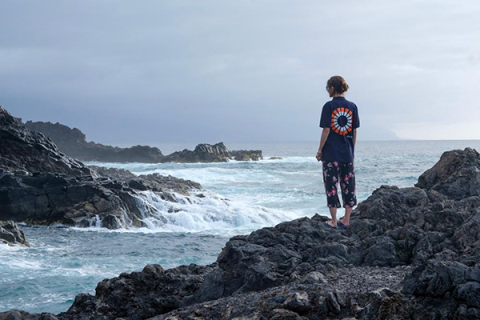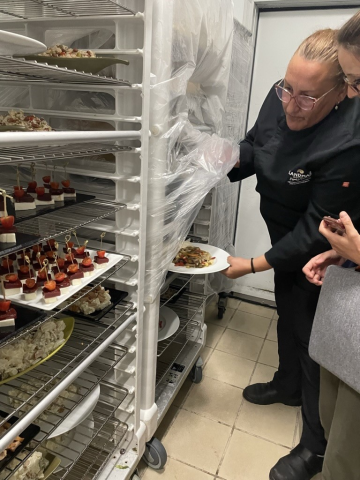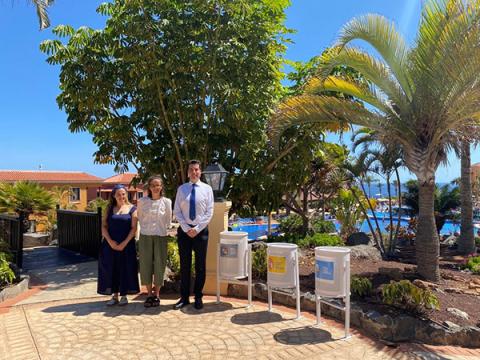How Oxford students are helping to shape the future of sustainable tourism
easyJet holidays has launched an innovative pilot programme that utilises AI to help the company reduce food waste and run more sustainable kitchens in its package holiday destinations thanks to research carried out by a small team of Oxford graduate students including ODID’s Laura Ballerini.
Laura, who is studying for the DPhil in International Development, was among a group of students who travelled to Tenerife in the summer of 2022 as part of the easyJet holidays’ Sustainable Tourism Programme, which enables Oxford students to work alongside businesses to identify and deliver solutions that help develop sustainable travel. The project grew out of a collaboration with the Oxford SDG (Sustainable Development Goals) Impact Lab, based at ODID.

Laura Ballerini during fieldwork in Tenerife (image by Ruby-Anne Birin)
Laura and three other students spent four weeks undertaking research to understand the scale of food waste in the island’s hotels and develop evidence-based solutions to tackle it. Reducing food waste is a global concern identified in the UN SDGs and is considered the third most promising solution to address climate change.
The other team members were MPP+MBA student Diego Rojas-Arancibia, Desmond Okumbor, studying for an MSc in Politics, and Ruby-Anne Birin, completing a DPhil in Archaeological Sciences.
'Kitchen-based ethnography'
‘We carried out mixed-method research and relied on a two-pronged approach,’ Laura explains. ‘The first was a quantitative survey which we sent to a sample of 85 hotels in Tenerife to ascertain pre-existing approaches to sustainability and current food waste management mechanisms.’
‘The second approach involved in-depth, semi-structured interviews with hotel directors, managers, and staff. These interviews aimed at gaining greater insights into the experiences and practices used by hotels to tackle food waste. Interviews were often accompanied by what we called ‘kitchen-based ethnography’, which essentially consisted of visits to hotel kitchens and long, informal conversations with chefs and kitchen staff.’

The team visited hotel kitchens throughout Tenerife to understand more about current food waste management practices
The team also engaged with a wide range of stakeholders with expertise in food waste, including leading researchers from local universities, public officials, private-sector experts, and representatives of local NGOs.
Their research revealed that 18% of food waste in Tenerife was generated by the hospitality sector alone and that most hotels on the island had limited to no measures in place to adequately quantify the amount of food waste they generated.
The team recommendation was a partnership with Winnow, a UK tech company, to provide AI solutions to enable hotels and resorts in Tenerife to measure and prevent food waste. They pitched their business case to easyJet holidays in July 2022.
Using similar technology to that of driverless cars, Winnow's AI tools learn to 'see' food being wasted through a connected terminal with a motion camera. Data is collected quickly and stored in the cloud. Hotel teams then receive reports that pinpoint waste, giving them the insight to make operational improvements.
Based on the Oxford team’s recommendations, easyJet holidays has now formed a first-of-its-kind partnership with Winnow for the launch of a pilot programme that will monitor the reduction of food waste at one of their most popular hotels, the Bahia Principe Sunlight Costa Adeje resort in Tenerife.

Ruby-Anne Birin (first from the left) and Laura (second from the left) visiting the Bahia Principe Sunlight Costa Adeje resort in Tenerife and interviewing its Deputy Manager (right)
‘It was an immense joy to see that the research efforts my team put into unpacking the major issue of food waste informed the launch of a first-of-its-kind pilot programme with the potential to make a substantial, tangible impact!” Laura said.
Following the successful outcome of the first year of the Sustainable Tourism Programme, a second cohort of Oxford students is undertaking Lab Fellowships to develop strategic and destination-based projects to help make easyJet holidays an industry leader in sustainable tourism.
One of the projects grew out of a new collaboration between easyJet holidays, the Lab, and the United Nation World Tourism Organization (UNWTO) and has the key objective of developing a global Environmental, Social, and Governance (ESG) Framework for tourism businesses. This Framework will help tourism companies to report their sustainability-related efforts in a standardised, credible, and comparable manner.
Laura, who is helping to develop this Framework, commented on the project: “The new Lab’s project of developing an ESG Framework for tourism businesses strives to address the multi-layered and complex challenges of today’s tourism sector by harmonising data collection processes and streamlining business reporting strategies. The project’s strong research focus and its reliance on multi-stakeholder expertise make this a truly unique possibility to trigger holistic change at an international level and move tourism systems towards more sustainable practices.”
Established in 2021, the SDG Impact Lab brings together the research expertise of Oxford University with partners across industry sectors, to address the most pressing challenges of our time. The Lab’s programmes enable talented graduate students to collaborate with non-academic partners to identify creative, interdisciplinary solutions that advance the UN SDGs.
Find out more about the SDG Impact Lab here.
